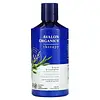What's inside
What's inside
 Key Ingredients
Key Ingredients

No key ingredients
 Benefits
Benefits

 Concerns
Concerns

 Ingredients Side-by-side
Ingredients Side-by-side

Water
Skin ConditioningCetyl Alcohol
EmollientGlyceryl Stearate
EmollientGlycerin
HumectantBehentrimonium Chloride
PreservativeCocos Nucifera Oil
MaskingBiotin
AntiseborrhoeicHydrolyzed Collagen
EmollientTheobroma Cacao Extract
Skin ConditioningHydrolyzed Pea Protein
EmollientAesculus Hippocastanum Seed Extract
Skin ConditioningCetrimonium Chloride
AntimicrobialGuar Hydroxypropyltrimonium Chloride
Skin ConditioningPolyquaternium-10
PEG-7 Dimethicone
Skin ConditioningLaureth-7
EmulsifyingPolysorbate 20
EmulsifyingDiazolidinyl Urea
PreservativeIodopropynyl Butylcarbamate
PreservativeParfum
MaskingWater, Cetyl Alcohol, Glyceryl Stearate, Glycerin, Behentrimonium Chloride, Cocos Nucifera Oil, Biotin, Hydrolyzed Collagen, Theobroma Cacao Extract, Hydrolyzed Pea Protein, Aesculus Hippocastanum Seed Extract, Cetrimonium Chloride, Guar Hydroxypropyltrimonium Chloride, Polyquaternium-10, PEG-7 Dimethicone, Laureth-7, Polysorbate 20, Diazolidinyl Urea, Iodopropynyl Butylcarbamate, Parfum
Aloe Barbadensis Leaf Juice
Skin ConditioningWater
Skin ConditioningBrassica Alcohol
EmollientGlycerin
HumectantCocos Nucifera Oil
MaskingBrassicyl Isoleucinate Esylate
Emulsion StabilisingCapryloyl Glycerin/Sebacic Acid Copolymer
Skin ConditioningCedrus Atlantica Bark Oil
MaskingCitrus Aurantifolia Oil
CleansingCitrus Aurantium Dulcis Peel Oil
MaskingCitrus Limon Peel Oil
MaskingCitrus Paradisi Peel Oil
MaskingEucalyptus Globulus Leaf Oil
PerfumingJuniperus Virginiana Oil
MaskingPersea Gratissima Oil
Skin ConditioningRosmarinus Officinalis Leaf Oil
MaskingZingiber Officinale Root Oil
MaskingAvena Sativa Kernel Extract
AbrasiveCalendula Officinalis Flower Extract
MaskingChamomilla Recutita Flower Extract
MaskingChenopodium Quinoa Seed
AbrasiveCitrus Aurantium Dulcis Fruit Extract
MaskingCitrus Grandis Fruit Extract
AstringentDaucus Carota Sativa Root Extract
Skin ConditioningLavandula Angustifolia Flower/Leaf/Stem Extract
MaskingPersea Gratissima Fruit Extract
EmollientRubus Idaeus Fruit Extract
AstringentSolanum Lycopersicum Fruit/Leaf/Stem Extract
AstringentBiotin
AntiseborrhoeicNiacinamide
SmoothingPanthenol
Skin ConditioningTocopheryl Acetate
AntioxidantGlyceryl Stearate
EmollientStearyl Alcohol
EmollientGluconolactone
Skin ConditioningSodium Benzoate
MaskingCitral
PerfumingLimonene
PerfumingAloe Barbadensis Leaf Juice, Water, Brassica Alcohol, Glycerin, Cocos Nucifera Oil, Brassicyl Isoleucinate Esylate, Capryloyl Glycerin/Sebacic Acid Copolymer, Cedrus Atlantica Bark Oil, Citrus Aurantifolia Oil, Citrus Aurantium Dulcis Peel Oil, Citrus Limon Peel Oil, Citrus Paradisi Peel Oil, Eucalyptus Globulus Leaf Oil, Juniperus Virginiana Oil, Persea Gratissima Oil, Rosmarinus Officinalis Leaf Oil, Zingiber Officinale Root Oil, Avena Sativa Kernel Extract, Calendula Officinalis Flower Extract, Chamomilla Recutita Flower Extract, Chenopodium Quinoa Seed, Citrus Aurantium Dulcis Fruit Extract, Citrus Grandis Fruit Extract, Daucus Carota Sativa Root Extract, Lavandula Angustifolia Flower/Leaf/Stem Extract, Persea Gratissima Fruit Extract, Rubus Idaeus Fruit Extract, Solanum Lycopersicum Fruit/Leaf/Stem Extract, Biotin, Niacinamide, Panthenol, Tocopheryl Acetate, Glyceryl Stearate, Stearyl Alcohol, Gluconolactone, Sodium Benzoate, Citral, Limonene
Ingredients Explained
These ingredients are found in both products.
Ingredients higher up in an ingredient list are typically present in a larger amount.
Biotin is a B vitamin that is naturally produced by our bodies. It is also called Vitamin H.
Our bodies use biotin in the metabolism process. It also helps our bodies use enzymes and move nutrients around. A biotin deficiency can lead to brittle hair and nails.
More research is needed on applying biotin topically. However, taking biotin orally has been shown to help nourish the skin, hair, and nails. They play a role in forming skin-hydrating fatty acids.
Biotin is water-soluble. It can be found in foods such as fish, eggs, dairy, nuts, and meat. Vitamin H stands for "haar" and "haut". These are the German words for hair and skin.
Learn more about BiotinCocos Nucifera Oil is obtained from the kernels of the coconut fruit. In other words, this is coconut oil.
Coconut Oil is rich in fatty acids with lauric acid making up the majority of these. It also contains linoleic acid. Due to this high fatty acid content, coconut oil helps trap moisture and soften skin.
Despite being antibacterial, coconut oil may not be great for acne-prone skin. It is comedogenic and may clog pores. This ingredient may not be safe for malassezia or fungal acne.
Note: Coconut Oil should not replace your sunscreen for UV protection. Studies show it only blocks about 20% of UV.
This oil is non-volatile and has a light scent.
The term 'fragrance' is not regulated in many countries. In many cases, it is up to the brand to define this term. For instance, many brands choose to label themselves as "fragrance-free" because they are not using synthetic fragrances. However, their products may still contain ingredients such as essential oils that are considered a fragrance.
Learn more about Cocos Nucifera OilGlycerin is already naturally found in your skin. It helps moisturize and protect your skin.
A study from 2016 found glycerin to be more effective as a humectant than AHAs and hyaluronic acid.
As a humectant, it helps the skin stay hydrated by pulling moisture to your skin. The low molecular weight of glycerin allows it to pull moisture into the deeper layers of your skin.
Hydrated skin improves your skin barrier; Your skin barrier helps protect against irritants and bacteria.
Glycerin has also been found to have antimicrobial and antiviral properties. Due to these properties, glycerin is often used in wound and burn treatments.
In cosmetics, glycerin is usually derived from plants such as soybean or palm. However, it can also be sourced from animals, such as tallow or animal fat.
This ingredient is organic, colorless, odorless, and non-toxic.
Glycerin is the name for this ingredient in American English. British English uses Glycerol/Glycerine.
Learn more about GlycerinGlyceryl Stearate is a mix of glycerin and stearic acid.
It is used to stabilize the mixing of water and oil ingredients. By preventing these ingredients from separating, it can help elongate shelf life. It can also help thicken the product's texture.
As an emollient, it helps soften skin and supports barrier-replenishing ingredients.
In cosmetics, Glyceryl Stearate is often made from vegetable oils or synthetically produced.
This ingredient may not be fungal-acne safe
Fun fact: The human body also creates Glyceryl Stearate naturally.
Learn more about Glyceryl StearateWater. It's the most common cosmetic ingredient of all. You'll usually see it at the top of ingredient lists, meaning that it makes up the largest part of the product.
So why is it so popular? Water most often acts as a solvent - this means that it helps dissolve other ingredients into the formulation.
You'll also recognize water as that liquid we all need to stay alive. If you see this, drink a glass of water. Stay hydrated!
Learn more about Water